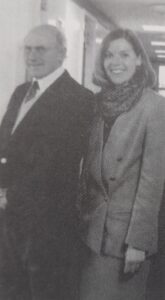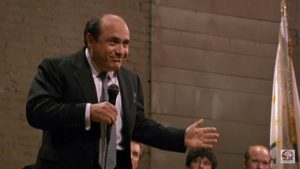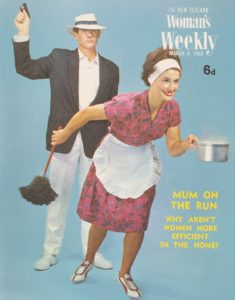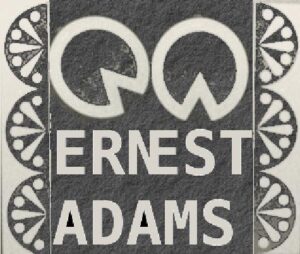1973: The Importance of Being Ernest Adams
August 12, 2022
By AHNZ

The once iconic Ernest Adams brand was part of the spirit of New Zealand and even a microcosm of the national history itself. We must ensure our country does not end in the same way. The 1930s company transitioned from an ambition to a spirit to what was, by 2000, a ghost. The ghost was exorcised in June 2022 without even a gesture. The owner, Goodman Fielder simply turned away. Whatever whispy vapours remained of Adams’ ghost evaporated in a blink.
Most histories of this firm would start out with the founding baker in 1929 who came to New Zealand with £100 fom his mother in law and a highly developed level of ambition. Ernest Adams came from an Australian family of bakers to cash in his share to start anew out of Christchurch. He was so fired up that he, a man with little capital, inspired Mr Hugh Bruce, Christchurch baker, not to retire but to start up a partnership with Adams and storm the nation.
However, 1973 is the great historic year for Ernest Adams and the focus for AHNZ. In this year Hugh Adams, 20 years boss of the company, took the company public and also the year it became a true national concern and bought out Adams Bruce. The two partners had divided their assets into those two companies years before, and divided New Zealand into territories of North and South Island (no Commerce Commission in those days.) This was the big year when Ernest Adams evolved into a new form of corporate entity and started to put on significant mass.
“A new company has been registered in Christchurch to take over the cake and biscuit business of Adams, Bruce, Ltd., in the South Island The new business, which will be known as Ernest Adams, Ltd., will be directed and controlled by Mr E. A. Adams, who has been managing director of Adams, Bruce, Ltd., since that business was established in June, 1921. The North Island business of Adams, Bruce, Ltd., will continue to be run under the same name…” – Press (1929;) Papers Past
“our biggest competition is the housewife” – Ernest Adams, Press (1966;) Papers Past
“Longstanding baking brand Ernest Adams has been discontinued without fanfare or warning after more than 90 years providing classic treats…..The disappointment of losing Ernest Adams baked goods has only been surpassed by the lack of acknowlegement from parent company Goodman Fielder.” – Ref. Supply lines blamed for demise of Ernest Adams’ baked treats, Stuff (June 2022)
“…to authorise the conversion of the company from its present status as a private limited liabilty company to that of a public company….A strange coincidence occured within a short time of these momentous events…rumour that the owners of Adams Bruce were thinking of putting their business on the market…” p155, Adams (2005)
 Hugh Adams (died 98yo, 2001) wrote a wondeful book, A Baker’s Tale, of his family business from all phases: ambition to spirit to ghost. He is one of the last of our Silent Generation to go. His peers include Kenneth Cumberland, William Pickering, Charles Upham, Rob Muldoon, Ed Hillary, Keith Sinclair, Norm Kirk, Robin Cooke, J.K Baxter, Patricia Bartlett, Alan Curnow, Ron Briley. An ‘artistic’ generation, no wonder Hugh intended to publish a novel after writing his history book. Having read his tale it’s easy to feel a strong affection for the man and to sense in him a similar spirit to his fellow Silents especially Curnow, Kirk, and Pickering.
Hugh Adams (died 98yo, 2001) wrote a wondeful book, A Baker’s Tale, of his family business from all phases: ambition to spirit to ghost. He is one of the last of our Silent Generation to go. His peers include Kenneth Cumberland, William Pickering, Charles Upham, Rob Muldoon, Ed Hillary, Keith Sinclair, Norm Kirk, Robin Cooke, J.K Baxter, Patricia Bartlett, Alan Curnow, Ron Briley. An ‘artistic’ generation, no wonder Hugh intended to publish a novel after writing his history book. Having read his tale it’s easy to feel a strong affection for the man and to sense in him a similar spirit to his fellow Silents especially Curnow, Kirk, and Pickering.
Hugh had a keen sense of what I would call Anarchist Spirit which he came by through healming a company through governments National 1.0 to National 4.0 and Labour 2.0-4.0. When The State’s Poultry Board controlled eggs and sent him contaminated and unfit-for-use product Hugh detected it and wrote an indignant letter. In reply the government telegramed back: “Stop testing.”
To grow, Hugh’s company needed logistics but the government controlled that too. “All business in those days took it as a matter of course that there was a plethora of government regulations controlling almost everything they wished to do,” he writes. It was illegal for the firm to transport its own product in its own vans more than 100 miles. Government rail had to be used but this was costly and slow and damaging to the highly perishable product. Hugh and his lawyers, from 1967, opened up the transport field by dueling it out with The State. Hugh wrote that he of all people has no cause to complain when stuck driving behind big trucks on our national highways since it was he who was the primary cause of it.
Because the government controlled flour and eggs, Ernest Adams purchased its own flour mill and had its own egg farms. It was the only way they could have any control over the quality of production.
To have high-speed machinery that would allow the firm to grow and to apply preservation wrapping would have to go through government too. Expensive, lobbying for multiple licenses and proof of why such consent was justified in the eyes of The State.
Hugh broke down doors for New Zealand business, earning the success of the company and affection of the staff and customers. We may also say the firm benefited from Fortress New Zealand by being first mover in many ways. Once loose of the red tape the firm could ‘head for the stars,’ as Hugh put it, while competitors were still shackled by supply, transport, and mechanical restrictions. But Adams didn’t make the world, he was just trying to live in it.
Coming Down To Earth
 Ernet Adams, by 1995, was doing so well that it became a victim of its own success. They were a New Zealand institution, a family triumph. Everyone happy: staff, shareholders, customers. They paid their debts, they paid high dividends, their assets and revenue supurb. They led the domestic market, they exported Kiwi products. The quality of their goods was premium. They employed hundreds at factories around the country and ran a fleet of profit-sharing truck-vendors.
Ernet Adams, by 1995, was doing so well that it became a victim of its own success. They were a New Zealand institution, a family triumph. Everyone happy: staff, shareholders, customers. They paid their debts, they paid high dividends, their assets and revenue supurb. They led the domestic market, they exported Kiwi products. The quality of their goods was premium. They employed hundreds at factories around the country and ran a fleet of profit-sharing truck-vendors.
Then, our old friend the government tipped over a domino that led to the end of Ernest Adams. The New Zealand Dairy Board (aka The Government) sold off a big chunk of Ernet Adams shares without warning to the company. The buyer was a merchant banker named Errol Clark who now, suddenly, had significant power over the firm. Think of Larry the Liquidator (image, left) from the film Other People’s Money (1991.)
Clark used his rights to quiz Adams, tour the facilities, examine the books. Shareholders were so accustomed to high dividends that one the occasion they dipped they became afraid enough to sell and this is when Clark struck. His people bought up a controlling interest in the company in a corporate raid. Hugh, during the hours of this taking place was indisposed because Clark was hosting him at the time peppering him with all sorts of questions in his home. When Adams returned to the office the raid was complete!
“Uncle Ernie baked it” – What GenX said when the plate they provided for a meeting came from Ernest Adams
In short, the rest is a story of decline. Clark was the first in a line of outsiders who picked the company to bits like seagulls would a washed up whale. It was too delicious to pass up, this tasty cake empire with its generations of good will. The transport fleet was liquidated. Factories shut down, consolodated. Workers made redundant, expensive consultants confounding the quality and organisation of the factories. It’s all in Hugh’s book. The empie crumbled like a big cookie, becoming worth less and less as new controllers passed it around and around.
 In the end, 1999, Goodman Fielder bought what remained. The scientific test bakery and high-quality products were gone but there was still about 23 years of milage in flogging the brandname recognition. This they did until the old spirit became a ghost.
In the end, 1999, Goodman Fielder bought what remained. The scientific test bakery and high-quality products were gone but there was still about 23 years of milage in flogging the brandname recognition. This they did until the old spirit became a ghost.
As Ernest himself said, “our biggest competition is the housewife” (now an extinct species.) New Zealanders made their own food, baked their own cakes, had access to great ingredients back in those days. To compete with that a manufacturer needed excellent quality and a competitive price. Ernest Adams succeeded at that and thrived during the Four Square Stores Era and the Supermarket Era.
In the 2020s there is no housewife to drive Ernest Adams to compete so the quality dropped. The neiche for what they did is now taken up by generic in-house bakeries at the supermarkets themselves. What’s the use in continuing quality product for a generation who don’t appreciate it? I suspect that if we were to sample a 1980s Ernest Adams, Griffins, or Cadbury product compated to its namesake today we would be suitably impressed. Likewise, striking a Beehive match (mostly useless now) or using Jif cleaner (parrot droppings now) is a completley different proposition to what it once was.
Spirit, Ghost, Memory, History, Legend, Myth
Generations of New Zealander, now, don’t know what they’ve lost and can’t taste any difference. Constructing a cake as it was in Ernest or Hugh’s time would be like trying to fly a Concorde again and at supersonic speeds. The technology, the parts, the expertise simply don’t exist any more. How good was Colonial era beer and bread? Nobody remembers. What New Zealand food tasted like in the past is a legend our elders must take to their graves and a myth to those who never had any. Ernest Adams is history.
—
Image ref. 1970s logo, AHNZ reconstruction (2022)
Image ref. colour 1970s logo, Darian Zam (2022)
Image ref. Hugh and Sarah Adams. Craig McNeil photo, Adams (2005)
Image ref. Women’s Weekly, in March 1964; Owain Morris collection; History Always Repeats
Ref. A Baker’s Tale, The Life and Times of Ernest Adams, Hugh Adams (2005)
 Like Comment Share
Like Comment Share






